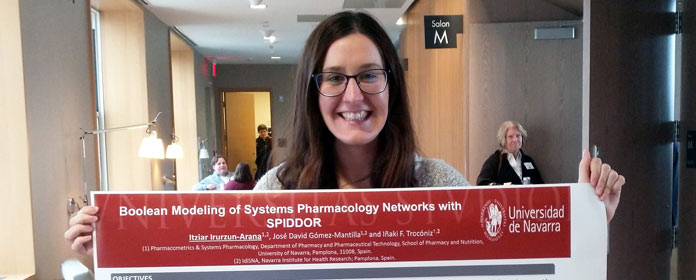Spanish science that competes and wins at MIT
thesis A biomedical engineer from Tecnun, Itziar Irurzun's doctoral thesis at the School of Pharmacy and Nutrition of the University of Navarra has taken her to Harvard for a stay at the University of Navarra.

Itziar Irurzun Arana (Ing Biomédica 15) admits that she did not expect to win the first award at the QSP Day 2018, organized at MIT (Massachusetts Institute of Technology), a forum where she has just presented the poster on a work she made for her doctoral thesis and related to a subject modeling for Systems Pharmacology networks.
Precisely as part of her doctorate -to which she has devoted the last three years under the direction of Professor Iñaki Fernández de Trocóniz within the group of research of Pharmacometry and Systems Pharmacology-, Itziar crossed the pond for a six-month stay at Harvard, at the department of Biostatistics and Computational Biology of the Dana-Farber Cancer high school .
There she learned about the lecture Quantitative Systems Pharmacology (QSP Day) and decided to apply. The award for the best poster she has achieved consists of one thousand dollars, but it is much more than that: "It shows that the research we do in Spain can be on a par with the best centers in the world", says the engineer, who belongs to the first class of Degree in Biomedical Engineering at the School of Engineering of the University of Navarra in San Sebastian (TECNUN).
Engineering, Pharmacy and mathematical modeling
His project of thesis seems to be unrelated to Engineering, but nothing could be further from the truth: "I am trying to develop and apply new methodologies in the design and implementation of Pharmacokinetic-Pharmacodynamic and Systems Pharmacology models". In other words, these are mathematical models that serve to describe and predict both the time course of drug concentrations in the organism and their action on the progress of the disease or other clinical manifestations.
"The interest of these models," adds Itziar, "is that, by means of computer simulations, we can relate dosing patterns to the observed clinical response. This allows us to optimize therapeutic regimens to obtain a response more in line with patients' needs." "My task as a biomedical engineer is, precisely, "to search for and improve computational methods that help develop and analyze this subject of models."
Dr. Michor's group , with whom she works during her stay at Harvard, specializes in development of computational models to predict (and thus prevent) the emergence of resistance to drugs used during chemotherapy, among other fields. "If we are able to describe the evolution of the tumor over time, and predict whether cancer cells can undergo mutations that make them resistant to drugs, we could find the best way to administer a drug to delay, as much as possible, the appearance of these resistances," stresses Itziar.
Once she finishes her stay and defends the doctorate, new professional challenges will open up for her. "I am not very clear about how to focus my future, although I would like to continue researching and developing this subject demodels, I don't know if I will do it in academia or industry, or through my own business". He knows, in any case, that the stay at Harvard multiplies, according to any mathematical model on employability, his job possibilities.




